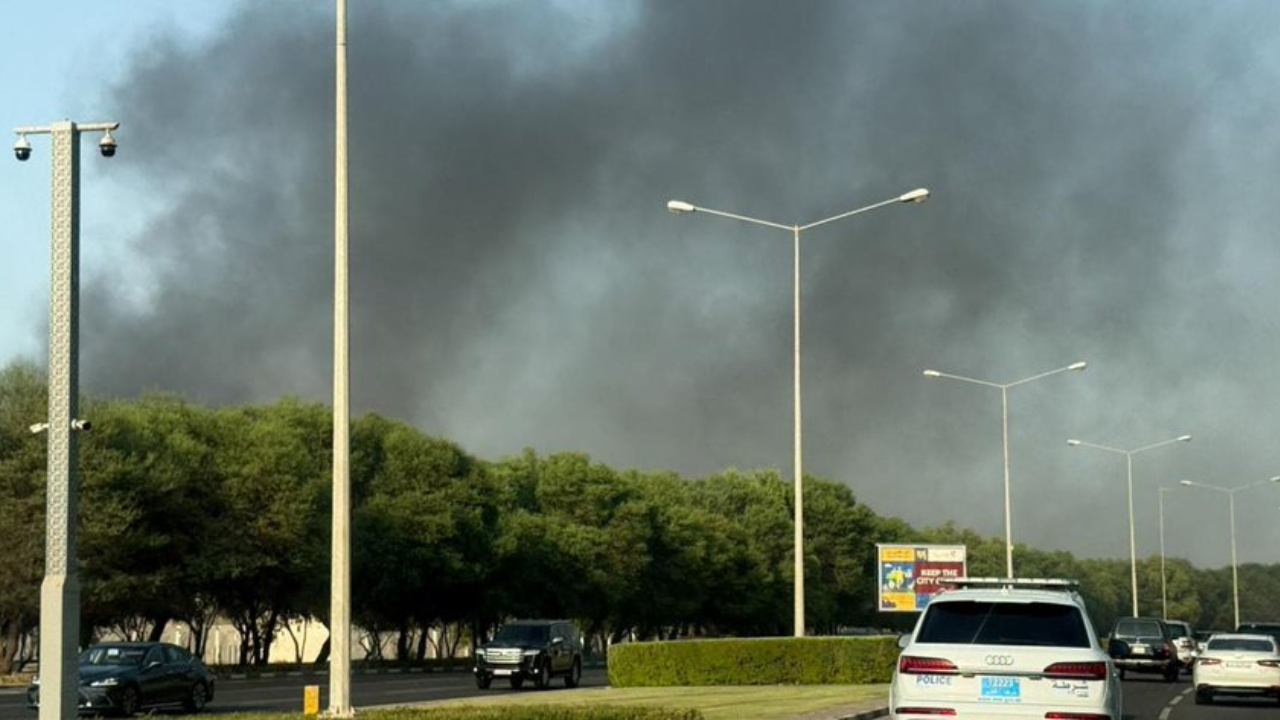
Post by : Naveen Mittal
The city of Doha, Qatar’s capital, usually moves at its own fast pace — cars on busy highways, tall glass skyscrapers shining in the sun, and neighborhoods filled with embassies and villas. But on this day, the city was far from normal. The silence on some streets told the story of fear.
Israel carried out an airstrike in Doha, targeting leaders of Hamas. This was something many believed Israel would never do on Qatari soil. The event has created a new storm of anger, questions, and fears for what comes next in the already tense Middle East.
The attack happened in a residential neighborhood known for luxury homes and foreign embassies. The strike blew a hole through the side of a building where Hamas leaders were believed to be discussing a peace proposal.
People nearby described the moment as terrifying. Police blocked journalists and others from getting too close, but it was clear the destruction was serious. Israeli officials reportedly gave the operation the code name “Judgement Day.”
One local man, aged 42, said he thought the world was ending when the missiles hit. “The noise was so loud my heart was pumping. I thought the world was going to end. I heard five rockets and ran. Everyone was running,” he said, still shaken.
This man, like many others in Doha, had never expected such violence in the city. Now he says he is very afraid the strikes might happen again.
Reports suggest the strike was aimed at Hamas leaders, including Khalil al-Hayya, a senior Hamas negotiator and exiled Gaza chief. Hamas has said their team survived, but other sources claim Hayya was critically injured. These claims remain unconfirmed.
What is confirmed is that Hayya’s son, his office head, and three bodyguards were killed. Whether they were standing close to him during the strike is unclear.
For now, Hamas officials in Doha are not answering their phones. They may be moving more secretly, as they no longer feel safe in a place that once provided security.
Even if the main targets were missed, Israel’s strike has already caused major political consequences. Qatar has called the attack “state terrorism.” The Qatari Prime Minister, Mohammed Al Thani, said the US gave no advance warning. He claimed the first American call came only 10 minutes after the attack began.
This situation has left Qatar, a major ally of the US and host of an American military base, furious.
At the same time, it has put pressure on international efforts to reach a ceasefire deal in Gaza. With this attack, many now believe the chances of such a deal are almost gone.
The strike shows that Israel is ready to cross boundaries that many thought were untouchable. Targeting Hamas leaders outside Gaza — and in a key US ally’s territory — signals that the conflict is widening.
This move also raises questions:
Will Qatar continue to host Hamas leaders after this?
Will the US put pressure on Israel, since its ally was attacked without warning?
What will this mean for the people of Gaza, who were waiting for signs of peace talks?
The Middle East is already tense due to the ongoing war in Gaza. With Israel’s strike in Qatar, a country far from the frontline, the conflict feels larger than ever before.
For ordinary people in Doha, the fear is real. Streets that once felt safe are now filled with anxiety. The memory of the explosions will not fade quickly.
People who lived through the strike say they are worried about what may come next. One man said he used to feel safe walking the streets of Doha, but now he looks over his shoulder. Parents kept their children indoors the day after the attack. The fear that violence could return is heavy in the air.
The next steps depend on how Qatar and other countries respond. Qatar has promised to raise the issue strongly and has already condemned the attack. The US, caught between two allies, will have to carefully balance its response.
As for Israel, the strike sends a message: no place is out of reach when it comes to targeting Hamas.
But with every missile, the dream of peace feels further away.
What happened in Doha is more than a strike. It has shaken trust, created new fears, and pushed the possibility of peace further from reach. While Qatar tries to recover from the shock, the world watches closely.
The people of Doha — and across the Middle East — are left with one question: if even Qatar is no longer safe, where can peace ever be found?










Curry Powers Warriors to Nail-Biting 109-108 Victory Against Spurs
Stephen Curry's 49 points propel the Warriors to a dramatic 109-108 NBA Cup triumph over the Spurs,

India Advances to Semi-Finals After Thrashing USA in Women’s Blind T20 World Cup
India secured a dominant ten-wicket victory over the USA, advancing to the semi-finals in the Women’

South Africa's Early Advantage as India Struggles on Day Two
On Day Two, India reached 138-4 as South Africa took three early wickets, complicating matters with

Kenta Nishimoto Defeats Lakshya Sen in Japan Masters Semifinal
Lakshya Sen's journey in the Japan Masters ends after losing to Kenta Nishimoto 19-21, 21-14, 12-21

Kenta Nishimoto Defeats Lakshya Sen in Japan Masters Semifinals
Lakshya Sen's run at the Japan Masters concludes with a loss to Kenta Nishimoto in the semifinals, 1

Major IPL Trade: Jadeja Joins Royals as CSK Signs Samson
In a significant IPL trade, CSK has acquired Sanju Samson from Rajasthan Royals in exchange for Ravi